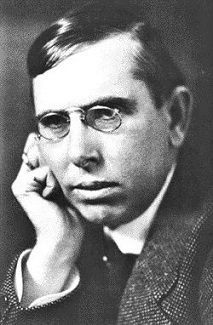Please note — I have interpolated my own comments. My comments are in all caps. — Roger Smith
It is not enough simply to state that Theodore Dreiser was a unique genius of American letters; that he was, indeed, but, more than that, he was a man born at a certain time and in a certain place, and moulded by time and place, so that he could become the articulate and splendid spokesman for that time and place. The turn of the century, the coming of age of American industrialism, the withering away of the independent farmer, the onrush of imperialism, the first great world conflict, the rise of the labor movement, the movement for women’s rights, the disillusionment and moral wreckage that followed World War I, the brief intellectual renaissance that spread like a flame across America, the mighty yet earthbound heroes of his native Midwest — all of these in turn and together reacted upon a man who was large enough to receive them and understand them, a man who was a curious mixture of pagan and Christian, provincial and urbane, a great mind and a great heart, turned by the endless search for the truth into a splendid artist.
— Howard Fast, Introduction to The Best Short Stories of Theodore Dreiser
THIS IS FULSOME PRAISE IN PART (IN FAST’S CONCLUDING WORDS), BUT IT IS NONETHELESS MOSTLY TRUE AND WELL SAID.
*****************************************************
… the type of story called a “casual” by the editors of The New Yorker magazine, is just that: a casual, a glimpse of life that lacks form and meaning. For a story to last, it must hold up in telling; it must partake of something of the richness and complexity of life, the action, reaction and interaction of the human beings who make up our society. More than by the story-teller’s art, mood and emotion must be determined by the characters themselves, by what they do to each other and by what society does to them.
Concerning this last, I know of no better example in American story telling than Theodore Dreiser. Certainly, we are a land not poor in story-tellers, and, with the possible exceptions of Russia and France, the short story has nowhere else developed to the height and richness it has here. But for all of that, Dreiser has no peer in the American short story. If his short stories are not yet sufficiently known his own genius is to blame; for his monumental novels overshadow them–perhaps rightly so, perhaps not. As fine as his novels are, they do not attain the artistic wholeness of his short tales; and I say this along with the opinion that no American has ever equalled Dreiser in the field of the novel.
Among the moderns, there is almost no one capable of writing tales like these. The best of today is pallid and nonhuman when compared with Dreiser’s compassionate searchings; the average of today is another medium, outside the pale of comparison. …
The key to Dreiser the artist is compassion, the compassion of a Hugo or a Tolstoy.
WHAT MOVED FAST ABOUT DREISER’S STORIES WAS THE EMOTIONAL CONTENT. I CAN SEE THIS, BUT I FEEL — WITHOUT HAVING READ ENOUGH OF DREISER’S STORIES TO BE ABLE TO SAY THIS WITH CERTAINTY — THAT DREISER’S SHORT STORIES ARE SECOND RATE. THE CHARACTERIZATIONS TEPID, THE WRITING WEAK — THIS IS NOT CHEKHOV.
TAKE A STORY SUCH AS “THE LOST PHOEBE.” IT IS REALLY HARD TO GET THROUGH. I WOULD CALL “THE LOST PHOEBE’ TREACLY. AND I THINK IT COULD HAVE BEEN CONDENSED TO THE FOLLOWING (71 WORDS), SAVING THE READER THE EFFORT:
A poor old farmer lost his beloved wife and could not overcome his grief. No one knew for sure if he had gone insane, but he sent years wandering the countryside looking and calling for her. At times, he thought he saw her ghostly apparition. At a climactic moment, he thought he saw his wife’s ghost at the bottom of a cliff. Reaching out, he tumbled off the edge and died.
*****************************************************
Howard Fast (1914-2003) was an American novelist and television writer. He joined the Communist Party USA in 1943 and during the 1950s was blacklisted for refusing to name names in testimony before the House Committee on Un-American Activities. The Best Short Stones of Theodore Dreiser, edited with an introduction by Fast, was published in 1947. Under the same title and by the same publisher, The Best Short Stones of Theodore Dreiser was republished in 1956 with a new introduction by James T. Farrell.
— posted by Roger W. Smith
March 2021

Dear Roger, I have just read your new post. I did not understand whose opinion was written in capital letters.
About The Lost Phoebe: I cannot agree with that . His prose in short stories is more James’s model than Chekhov’s . He is interested in the precise observation of the psychological shades and stages . And The Lost Phoebe, as I see it, is one of the best stories about aging, getting old ; very moving.
Всего доброго, И.В. Морозова
LikeLike
Irina — First of all, the comments in all caps are mine. I should have made that clear.
Secondly, I am perhaps guilty of giving “The Lost Phoebe” (and Dreiser’s short stories in general) short shrift. I need to reflect about this. I appreciate the comment.
Roger
LikeLike